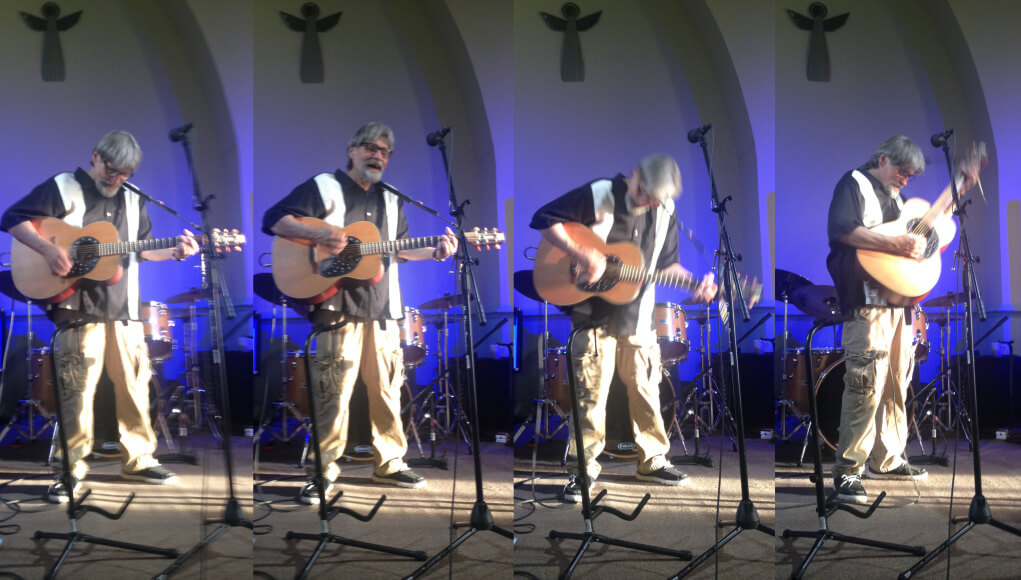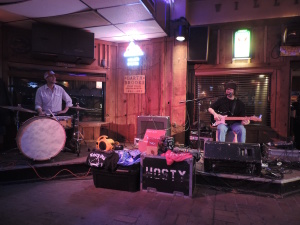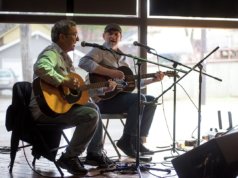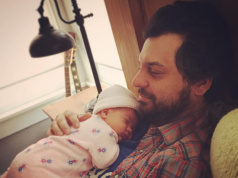
We’re all going to die, but the legacy of songwriters lives on in the music they made, the songs they wrote and how they affect people.
On the Red Dirt Radio Hour, a KOSU show from Brad Piccolo and John Cooper of the Red Dirt Rangers, Cooper recently said the chorus in Bob Childers’ Just Like Tom Skinner’s Blues — “I like it kind of cosmic, I like it kind of country, I like it wild and I like it free” — tells more about red dirt music than any other description.
The lyrics say, “I love the blues, jazz and the classics, but I got to have my rock and roll” with mentions of everyone from Jimi Hendrix to Hank Williams to Frank Sinatra to Emmylou Harris to Bob Marley to Ray Charles.
RELATED
Mike Hosty: The business of the music business is music by Dennis Whiteman
Tom Skinner passed away last year after 20 years spent battling heart disease.
“If there were no Tom Skinner, there’d be no red dirt music scene,” Piccolo said on another show when Skinner was inducted in the Oklahoma Music Hall of Fame.
Ink on skin is another kind of legacy that isn’t easily removed.
Skinner’s face has now shown up in the form of a tattoo on the arms of Byron White of The Damn Quails and Cody Canada of The Departed and Cross Canadian Ragweed fame.

“He taught all of us songwriters to eat our vegetables so we could grow up to be almost as big and strong as he was,” White wrote on the band’s blog last summer when Skinner died. “Tiny was his nickname, but his spirit and his gumption were as big as life and twice as beautiful.”
Skinner, who was inducted into the Oklahoma Music Hall of Fame in 2015, just four months before he died, entered St. John Medical Center last July for the final time just days before the Woody Guthrie Folk Festival, where he had performed many times over the years. He died of congestive heart failure the day after the festival ended.
‘Remind people about Tom’
At a concert in Perkins a day after Skinner passed, Monica Taylor told a story about visiting Skinner in the hospital during those final days. She knew she had found his room by all the guitar cases lining the corridor.
A month after Skinner died, more than 300 friends, songwriters and musicians gathered outside Olive, Okla., for a Tom Skinner Memorial Concert that included his songs, the songs he liked and stories told over a lifetime of playing music with friends in Oklahoma. Skinner himself worked on the set list for the memorial and planned out what each musician would play.
Similar to the annual Bob Childers concert in Stillwater, the Red Dirt Relief Fund is planning an annual concert in Tulsa’s Brady Arts District (where the Woody Guthrie Center is located) starting in October to honor Skinner and raise money for the organization.
“This event will remind people about Tom, his work, his life and the spirit he brought to the songwriter community,” said Katie Dale, secretary of the board of directors of the Red Dirt Relief Fund, who is producing the event. “It will help pay that forward to younger musicians who maybe never had a chance to play with Tom, but could be inspired by the memories and the stories he left behind.”
‘Great at archiving — just not in any useful way’
When Prince died last month, it’s said he had a locked vault at Paisley Park full of recordings and songs just waiting to be discovered and released to the public.
When Skinner died, he left his son Jeremy and grandson, Flash, a duffle bag filled with notebooks of songs — some that he had written and some written by others — that will help shape his legacy.
“Red dirt musicians aren’t good at archiving in particular,” Jeremy said during a breezy afternoon near the Woody Guthrie Center. “Actually, I think they’re probably great at archiving — just not in any useful way.
“I’ve got songbooks. I have a BIG duffle bag filled with binders, filled with individually protected song lyrics — his songs, other peoples’ songs, hundreds of them, thousands of them. In addition to that duffle bag I’ve got an egg crate with five to 10 binders just filled with more.”
‘A kernel of truth in every song’
Skinner was well aware of the difficulties of the songwriter’s trade. From A Nickel’s Worth of Difference:
Well, I try and try to write new songs,
and I pray I come up with something,
but as you can see, lately, I’ve not nothing intelligent to say,
‘just yada, yada, yada, blah, blah, blah,
so much jibber jabber, a little abra cadabra,
and then some ladi frickin’ da.’
Cooper called that tune a stream of consciousness song where Skinner was “just talking about what was in front of him” as he drove down Highway 99 from Nebraska to Oklahoma.
“There ain’t a nickel’s worth of difference in Kansas and Nebraska — a lot of wide open spaces, every now and then a tree. I suppose if you were raised around there, you might beg to differ. But I’m from Oklahoma, it all looks pretty much the same to me,” Skinner wrote.
Jeremy said some of Tom’s lyrics will find their way to the Woody Guthrie Center, where on the original handwritten lyrics to This Land is Your Land that Woody wrote in 1940, “All you can write is what you see.”
In addition to being a great songwriter, Skinner could take other people’s songs and make them his own, including songs about baseball, politics, religion and love.
“He found a kernel of truth in every song he was covering and he made it his,” Jeremy says. “He presented it to you in a way that only he could. He was really good at seeing through to the truth of something and rephrasing it in his own words. I feel like that’s what he did with songs without even changing the lyrics, he made it his.
“He was a fundamentally good guy. He affected a lot of people. That was his super power.”
Others agreed.
“That’s what was so great about Tom Skinner. He could take someone else’s song and you feel like he makes it his own, puts his own stamp on it,” said Piccolo. “All the songs he sings could be made into movies.”
For 15 years, Skinner had a weekly gig at the Colony in Tulsa where he regularly played with bandmates Don Morris, Gene Williams and a cast of hundreds during his Wednesday Night Science Project. Since his passing, the shows have continued, featuring nearly everyone you can think of who has ever played so-called red dirt music.
Support from the red dirt family
People are used to supporting Kickstarter campaigns to help musicians record and distribute records, but campaigns to raise money for burying musicians and songwriters is a bit more intense.
Thanks to their red dirt family, a little more than $12,000 was raised for the Tom Skinner Family & Memorial Fund organized after Skinner’s death. That enabled Jeremy Skinner to take a couple of months off to deal with his and his son’s grief, and Flash now has an Oklahoma 529 Savings Plan for college. “All the love that people had for my dad, it fell to me throughout this whole experience,” Jeremy said.
Jeremy said his father had hoped to leave his body to science, but at the time he died, the medical schools didn’t need any more bodies because school wasn’t in session. Even if you think you’ve planned how things will go down when you die, others make the ultimate decisions about what happens to your physical body and your legacy.
Steve Pryor unexpectedly killed in crash
It seems like a musical icon passes every week. Prince didn’t make it. The jury is still out on Keith Richards, but Merle Haggard didn’t make it, either. Last week, it was Austin songwriter and legend Guy Clark, and earlier this month it was Tulsa bluesman Steve Pryor.
That part of the Grammy Awards where they salute all the artists who have died is going to be extra long next year. Similarly, Pryor will be honored at Cain’s Ballroom on June 4.
While Skinner had been in poor health for years and his passing wasn’t completely unexpected, earlier this month, Steve Pryor, a legendary Tulsa blues guitarist who played with John Lee Hooker, Albert King, Buddy Guy, B.B. King, Bonnie Raitt, Greg Allman and Johnny Winter, to name a few, was killed in a motorcycle wreck in Tulsa.
Similar to Skinner’s Wednesday Night Science Project, Pryor had a regular gig called Steve Pryor’s Tuesday Bluesdays that will continue at Soul City of Tulsa. Pryor’s family set up Steve Pryor’s Burial/Memorial Fund to cover the cost of his burial and headstone.
Dying isn’t cheap, even for blues guitarists and red dirt songwriters with an untapped legacy of songs.
(Correction: This story has been updated to reflect the correct amount of money raised for the Tom Skinner Family & Memorial Fund.)


















